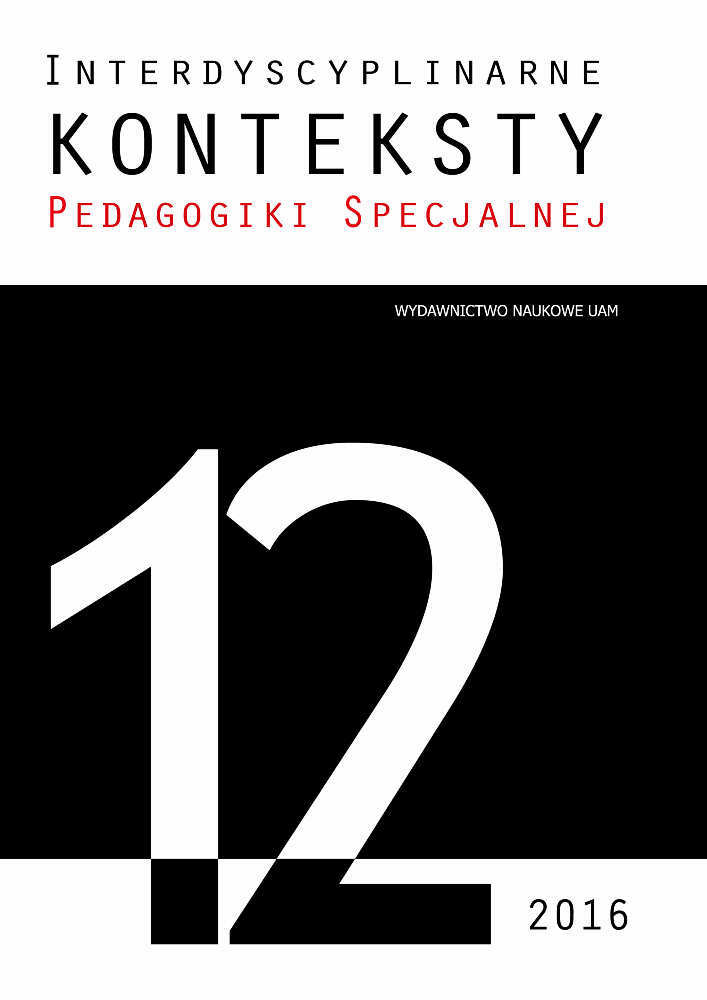Abstrakt
Parenthood of people with intellectual disability is still a controversial issue but cannot be avoided because many of them want to have families and be parents. Altogether with introducing the idea of normalization, integration and empowerment they strive more and more intensively for their right to “normal” life. The main doubt is if they can be good parents. Previously the opinion was that intellectual disability makes it impossible and that their children are always in danger of poorer environment, neglect of their needs or abuse. Now factors influencing parenthood abilities are better identified. They are: socio-economic status, family functioning, parents' physical and mental health, child characteristics, social factors and others. Nowadays the main question is not if people with intellectual disability can be parents but how to support them to be good parents.
Bibliografia
Aunos M., Goupil G., Feldman M., Mothers with Intellectual Disabilities Who Do or Do Not Have Custody of Their Children “Journal on Developemental Disabilities” 2005, Volume 10, nr 2.
Feldman M., Self-Directed Learning of Child-Care Skills by Parents With Intellectual Disabilities, “Infants and Young Children” 2004, Vol. 17, No. 1.
Grutz M., Osoby z niepełnosprawnością intelektualną jako partnerzy, małżonkowie i rodzice – dotychczasowe doniesienia badawcze, [w:] Dorośli z niepełnosprawnością intelektualną w labiryntach dorosłości, red. B. Cytowska, Wydawnictwo Adam Marszałek, Toruń 2011.
Kandel I., Morad M., Vardi G., Merrick J., Intellectual Disability and Parenthood, “The Scientific World Journal” 2005, nr 5.
Kruk-Lasocka J., Wawrzyniak A., Co zrobić z tą miłością? Refleksje nie tylko nad dorosłością osób upośledzonych umysłowo, [w:] Rehabilitacja, opieka i edukacja specjalna w perspektywie zmiany, red. Cz. Kosakowski, A. Krause, Wydawnictwo UWM, Olsztyn 2004.
Llewellyn G., Traustadottir R., McConnell D., Sigurjonsdott H., Introduction, [w:] Parents with Intellectual Disabilities: Past, Present and Futures, red. G. Llewellyn, R. Traustadottir, D. McConnelln, H. Sigurjonsdott, A John Wiley & Sons Ltd. Publication, Chichester 2010.
Llewellyn G., Hindmarsh G., Parents with Intellectual Disability in a Population Context, “Current Developmental Disorders Reports” 2015, nr 2.
MacLean K., Aunos M., Addressing the Needs of Parents with Intellectual Disabilities: Exploring a Parenting Pilot Project, “Journal on Developmental Disabilities” 2011, v. 16, n. 1.
Perkins T., Holburn S., Deaux K., Flory M., Vietze P., Children of Mothers with Intellectual Disability: Stigma, Mother–Child Relationship and Self-esteem, “Journal of Applied Research in Intellectual Disabilities” 2002, nr 15.
Taylor S., Foreword, [w:] Parents with Intellectual Disabilities: Past, Present and Futures, red. G. Llewellyn, R. Traustadottir, D. McConnell, H. Sigurjonsdott, A John Wiley & Sons Ltd. Publication, Chichester 2010.
Zawiślak A., Jakość życia rodzinnego młodocianych i pełnoletnich matek z niepełnosprawnością intelektualną, [w:] Sfery życia osób z niepełnosprawnością intelektualną, red. Z. Janiszewska-Nieścioruk, Kraków 2005.
Żyta A., Małżeństwa i rodzicielstwo osób z niepełnosprawnością intelektualną – wyzwania współczesności, „Edukacja Dorosłych” 2013, nr 2.
